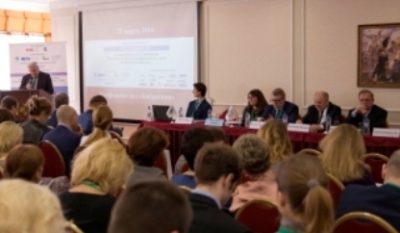The Eighth Annual conference “State regulation and the Russian Pharmaceutical Industry- 2016. Continuation of the dialogue” has been held in Moscow on March 31. The conference was a joint project of the Association of Russian Pharmaceutical Manufacturers (ARPM), Association of International Pharmaceutical Manufacturers (AIPM), Analytical company- DSM group, and the Research institute on healthcare organization and medical management of the Healthcare department of Moscow. Traditionally the event was attended by authorities, manufacturers and industry experts. The participants discussed their views on the current industry issues, particularly on the regulation of the single market within the Eurasian Economic Union (EAEU). Over 200 people attended the conference.
“We thought that by now the market will be working under the conditions of the single market of the EAEU, however, it is not the case yet. The new conditions are functioning, but not fully. The legislation is still being discussed and I ask participants to touch upon those issues at this conference,” said ARPM Director General, Victor Dmitriev in his opening speech. An acting director of AIPM, Vladimir Shipkov noted that the conference is a unique platform on the market that annually brings together all interested parties of the industry. Mr. Shipkov asked the participants to primarily discuss those issues that slow down the work of the single EAEU market.
Participants of the conference discussed the new regulation of drug circulation, and it’s application within the single EAEU market. First deputy director of the Institute of Legislation and Comparative Law under the Government of Russia, Anatoly Kapustin said that the mechanisms of the implication of international obligations do not always match in different EAEU member- countries. It is important to provide an effective implementation and help to form the single market. For example, the issue of interchangeability is still debatable. According to Mr. Shipkov, all the EAEU members except for Russia rejected the proposal to include the procedure to determine interchangeability into the package of medicine registration procedures. However, the Federal Antimonopoly Service of Russia insists on the adoption of this practice. Due to the decision to adopt the legislation documents in the bundle, it is expected that the 25 acts will be fully adopted shortly.
The other topic of the conference was the opportunity to adopt obligated licensing. According to Director of the Independent Institute of social innovations, Larisa Popovich, the mechanism of obligated licensing should be only used in extreme situations. For example, when it is impossible to cooperate with a producer in the drug is needed to save people’s lives. Mr. Dmitriev noted that the conditions of obligatory licensing should be outlined in details.
Mr. Dmitriev also spoke about the situation with inspections of foreign production facilities. It was proposed at the conference at the Ministry of Industry and Trade of Russia that those foreign producers that make and export substances into Russia for further production should not be inspected with accordance to the GMP rules. Also, the transition period for inspections was determined to be two years.
Head of the Department of the Organization of State Quality Control of medicine under the Roszdravdazor, Valentina Kosenko spoke about activities of the agency with respect to quality control.
A statistical analysis of the current condition of the EAEU was presented by DSM group Director General, Sergey Shulyak. According to the company, the pharmaceutical market of the EAEU exceeded $20,6 billion with 85% (over $17 billion) the volume of the Russian pharmaceutical market.
A small session on the issues of Good pharmacovigilance practices held under the conference. Director of the center of Educational programs of FGBY “NCESMP” under the Health Ministry of Russia, Rosa Yagudina spoke about the programs to train and increase professionalism.
Deputy head of the department of management of an organization of quality control of medicines under the Roszdravnadzor, Sergey Glagolev spoke about the development of the system pharmacological control. He also noted a significant improvement in some regions, getting the system closer to the GMP standards.
Deputy director of the FBGY “NCECMP” of the Health Ministry of Russia, Boris Romanov said that some parameters of pharmacovigilance have significantly improved lately. For example, the number of complaints on side effects reached the WHO recommended the level of 162 complaints per 1 million people are a year.
The conference gave an opportunity for producers to ask the authorities, and the authorities were able to hear the opinion of business certain issues.
ARPM thanks, all participants and guests and welcomes to join the next conference in 2017

